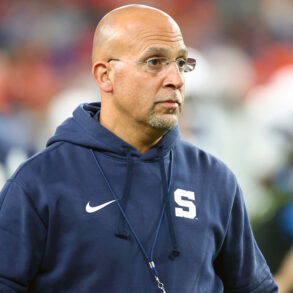
The NFL plans major rule adjustments for the 2025 season, and the Tush Push play will be their central target. Professional football organization the Green Bay Packers formally requested a ban against the “Tush Push” play that Philadelphia Eagles teams have consistently used. Additional major rule modifications join the top items for consideration as part of the 2025 NFL season. Such approved modifications will affect team strategic planning and competition in upcoming season matches.
This play gave teams an unfair edge, and now it’s on the chopping block.
The “Tush Push” delivers substantial benefits to the Eagles through its successful execution in critical short-yardage downs by using particular defensive personnel to push the quarterback from behind. Under their proposal, the Packers want to ban every offensive player from using contact to push their relative linesmen after they receive the snap. Successfully approving this rule would trigger a ten-yard penalty upon teams attempting to perform this specific play. Players, game performance safety, and game speed maintenance are why the Packers advocate for this ban.
The execution of this successful play currently represents too much power for defences to handle minimal yardage advances. Opposition views the play as it provides a forbidden benefit to teams yet violates the core principles of athletic competition. A ban endorsement, according to team opinion,s would enable teams to implement strategic adjustments during these critical situations. The opponents who oppose the potential ban maintain the strategy represents appropriate rule enforcement.
No more easy first downs? This proposed rule change could shift the defences’ fate.
The Detroit Lions have suggested major adjustments to defensive contact infraction penalties as an essential proposal to the NFL. The enforcement of these violations now grants an immediate first down to the opposing team. In their initiative, the Lions want to stop the automatic first-down rule because they believe the defence suffers too harshly under current regulations. Sports officials advocate for this modification to introduce a balance between teams since these current penalties primarily disadvantage specific teams.
These penalties prevent defensive players from feeling satisfied because they occur repeatedly to benefit offensive team drives. Defenders would succeed better in preventing offences if this enforcement rule received modifications. The modified enforcement rule would produce fewer points during games with consequences for increasing offensive efficiency. Changing the play alignment balance may motivate football teams to produce improved offensive line methods.
Overtime rules could get a major facelift—here’s what that means for teams.
The Philadelphia Eagles have suggested that regular-season overtime rules should equal those used throughout playoff games. The current rules permit a game to end before overtime begins when the team picking the coin toss scores a touchdown in its opening drive. Both teams possess the ball once throughout a 15-minute overtime period, according to the Eagles’ proposal during regular season games.
This change exists to create competitive equity and give teams equal chances of victory. Several teams end competitions without handling the ball during extended periods. By introducing this modification, teams would escape coin toss determinism in deciding their game result. Football fans have disapproved of this system mainly because it fails to find a better team.
A potential successful approval of this proposal would likely result in prolonged stressful games. The proposal would strengthen teams’ defensive approach during overtime periods. The modification would likely find support from both playing and coaching staff as they consider it an equitable way to decide close games. Opponents contend that lengthening overtime duration introduces higher injury possibilities to athletes.
Playoff spots could soon depend on records alone—bad news for weak divisions.
The Lions are advocating a revision of the postseason seed distribution formula. Despite their season victory record, the division champions automatically receive spots among the top four seeds. Based on team records, only the Lions advocate that higher seed positions should be given to wild-card teams rather than division winners.
The proposed structural change would recognize team performance across the full season, thus producing better competitive matches during playoff times. The National Football League often awards lower seeds to strong division winners than to weaker teams from weaker divisions. People believe the current seed selection process produces unequal situations, which minimizes competitive games. The new seeding system would eliminate all relationship-based factors to establish the playoff rankings exclusively based on merit.
Studies suggest the playoff seeding modification would elevate playoff competitions to a higher level of excitement. Better-seeded teams will experience equal opportunities because the outdated seeding practices will be eliminated. Teams maintain different points of view about whether winning a division should maintain its previous importance. The upcoming NFL meetings will feature discussions about this particular rule as one of their primary points of focus.
This post was originally published on this site be sure to check out more of their content.








